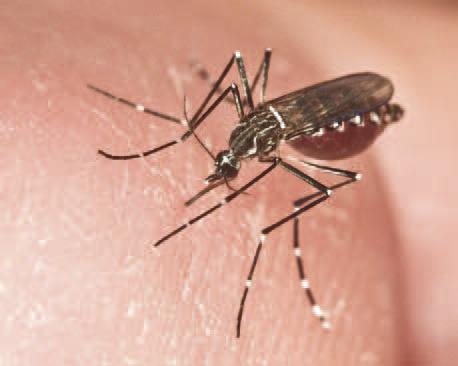After a hurricane, flooding and scattered debris that hold water are breeding grounds for mosquitoes. Considering Hurricane Ian dropped 15 inches of rain on Osceola County, and much of that stood and pooled -- and in some places is still present two weeks later -- those bugs will likely be an issue in our area going forward.
“An increase in mosquito numbers can most likely be expected in the weeks following a hurricane,” said Eva Buckner, an assistant professor and medical entomologist at the University of Florida’s Institute of Food and Agricultural Sciences (UF/ IFAS). Buckner, an Extension specialist at UF/ IFAS Florida Medical Entomology Laboratory in Vero Beach, remains in close contact with Florida’s more than 65 mosquito control districts providing training, solutions and information on topics including mosquito identification, mosquito-borne diseases, integrated mosquito management and more. Some things to consider: The flooding from hurricanes can cause mosquito eggs laid in the soil by floodwater mosquitoes during previous floods to hatch. This can result in very large populations of floodwater mosquitoes. Most of these mosquitoes are considered nuisance mosquitoes because they can be annoying biters that do not transmit any viruses to humans. Additionally, if floodwaters do not recede, standing water mosquitoes may start laying eggs on the standing water.
In general, floodwater mosquitoes are just considered nuisance mosquitoes, except for Aedes aegypti, the yellow fever mosquito. increased rainfall may result in increased hatching of Aedes aegypti eggs from water-holding containers.
Steps to take to protect from mosquito bites: Remember to wear long-sleeved shirts and long pants. Use Environmental Protection Agency (EPA)registered insect repellents with one of the following active ingredients: DEET, picaridin, IR3535, oil of lemon eucalyptus, paramenthanediol or 2-undecanone.
Draining water is recommended for reducing mosquito habitats in water-holding containers that individual homeowners have control over, such as pet dishes, vases, birdbaths, buckets, toys, flowerpot saucers and cans. Reduce the risk of diseases just by dumping containers. To kill immature mosquitoes in pools at homes without electricity to run pumps, use mosquito bits or dunks. These microbial insecticides can be purchased at hardware or box stores.
UF-IFAS Extension Services contributed to this report.




